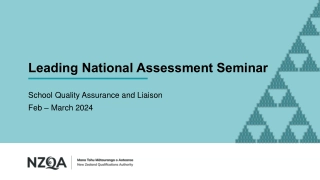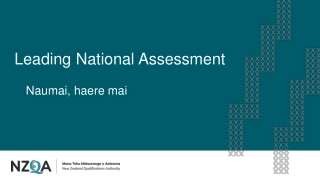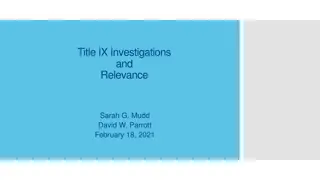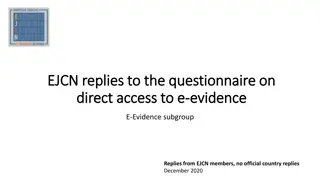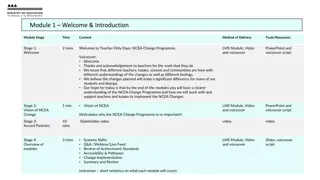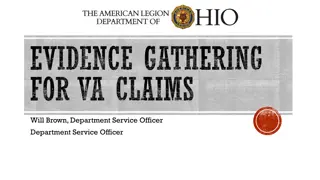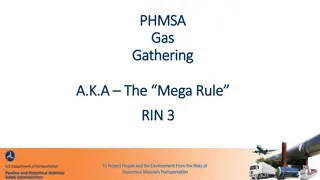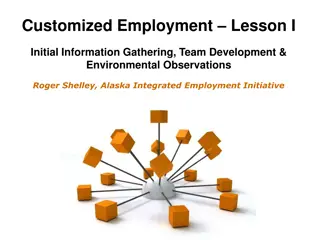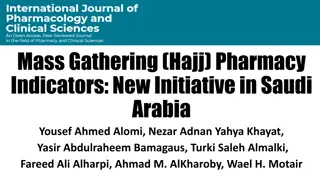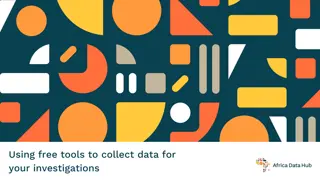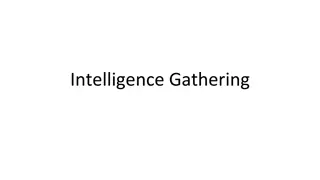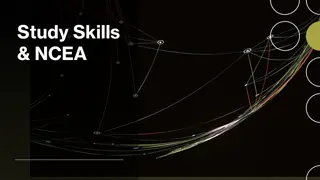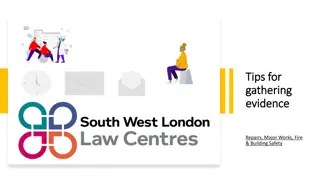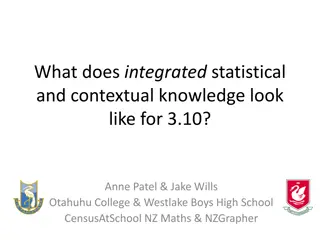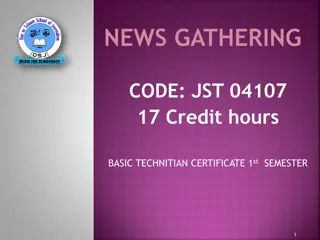NCEA Evidence-Gathering Strategies for Teachers
This guide explains how teachers can use the flexibility of NCEA to gather credible assessment evidence, tailored to meet student needs. It emphasizes the importance of integrating assessment with learning, producing valid evidence, and ensuring fairness and transparency in assessment practices. Teachers are encouraged to adapt to flexible evidence-gathering processes during disruptions like COVID-19, with support from NZQA to maintain the integrity of assessment against internal and external standards.
Download Presentation

Please find below an Image/Link to download the presentation.
The content on the website is provided AS IS for your information and personal use only. It may not be sold, licensed, or shared on other websites without obtaining consent from the author. Download presentation by click this link. If you encounter any issues during the download, it is possible that the publisher has removed the file from their server.
E N D
Presentation Transcript
Evidence-gathering strategies This guide shows teachers how to use the flexibility of NCEA to gather credible, standard-specific, assessment evidence 25 August 2021
Background NCEA Qualification Schools and NZQA s quality assurance processes continue to apply. Schools will need to provide coherent learning programmes and qualification pathways to meet the needs of their students. NZQA has flexible evidence gathering systems to support schools unable to deliver assessment under normal conditions. NZQA's analysis of 2020 achievement data showed no significant change from expected data patterns. Within this context, teachers need to: tailor learning and assessment opportunities to meet student needs During the 2021 COVID-19 disruption, teachers are again encouraged to use a flexible evidence gathering process in their teaching and learning programme as appropriate. use flexible assessment timeframes assess when ready, as appropriate NZQA continues to have confidence in the professional judgements of teachers to base their assessment decisions on valid, authentic evidence, so that results are credible. gather valid evidence using a range of approaches. NCEA s flexible design enables this for schools.
The bottom line has not changed Key principles of good assessment Always keep in mind that assessment needs to: be integrated with learning have activities that will produce valid, authentic and sufficient evidence be fair and transparent ensure judgements are consistent and verifiable be manageable for both students and staff. Adapted from Learning and Assessment A guide to Assessment for the National Qualifications Framework, 2001
NZQA will assist schools to: continue to carry out credible assessment against internal and external standards use modified evidence gathering strategies where usual methods are not feasible, to remotely manage student assessment against internal standards and practice for external standards build teacher confidence in using their professional judgement for gathering and recording standard-specific evidence towards internal and external standards.
Who is the target student for these evidence gathering strategies? These strategies are only available for students enrolled in NCEA assessment with their school of enrolment, where results are reported using that school s Provider code. External providers can be used if an MoU or subcontracting arrangement was in place at the time of school closure. These strategies cannot be offered to New Zealand students overseas, e.g. on exchange1. These strategies are not applicable to New Zealand Scholarship, for which candidates will still complete formal final assessments. 1. The only exception to this is in approved cases. Refer to Circular A2020/18.
Ensuring valid evidence gathering You DO need to ensure assessment happens within coherent teaching and learning programmes You DON'T need to keep doing assessments under test conditions You CAN use a spreadsheet, templates, or portfolio approach for recording the evidence-gathering process (see slide 12) physically collect and/or collate the actual evidence see or hear sufficient standard-specific evidence to make a valid assessment judgement against the criteria of the standard consider partial evidence collected over time assess every student in the same way or at the same time consider a range of sources of evidence ensure the evidence is authentic complete a detailed template for each student collect and collate evidence for use with later assessments including MCAT or practice externals record the forms of evidence witnessed - e.g. conversation, conferencing, blog entry, video, email
Review Teaching and Learning Review your programme of learning to take account of the impact of disruptions, changes in delivery methods, and student needs. Your programme of learning must still relate to the students learning pathway and your assessment must meet the requirements of NCEA. What changes might you make as a result of the COVID-19 disruption? Review assessment programme focus on standards, internal / external balance to meet student qualifications / pathways aspirations Review content, skills, assessment contexts Reorder the sequence of learning Use the same processes and evidence collection methods for practice external grades as for internal assessments Accommodate student need Consider combining tasks, assessments, and learning areas where feasible.
Review learning and assessment NZQA advises you to consider: reviewing your teaching and learning programme identifying when and where assessment evidence is likely to be generated, and creating opportunities to gather appropriate evidence at these points prioritising qualifications for your potential leavers. Depending on individual need, this could be Level 2 or Level 3 for students moving into the workforce or further training, or for those moving into tertiary study it could be University Entrance. using the flexibility of the qualification. o Students don't need to complete a lower level qualification before moving to the next level. If students don't manage to achieve sufficient credits, those they subsequently achieve from a higher level can fill any gaps in achievement at a lower level. o Students can catch up and be awarded their certificate in 2022 if they are returning to school.
Review learning and assessment Without compromising the teaching and learning programme and students' qualifications goals, NZQA advises that you consider: reducing the number of standards assessed, if necessary. You don t need to assess everything that is taught if you can t do so validly. prioritising assessment which is gathered over longer time intervals such as projects, research and portfolios rather than one-off assessment events such as tests. holding off doing a test for now if it is not interchangeable with an alternative mode of assessment. Teaching can still be carried out with assessment delayed. building confidence by assessing internal standards first.
What evidence can you gather? Evidence must be valid and standard-specific, and sufficient. Evidence can be seen or heard. Collection and collation of physical evidence is not required. Conditions Methods What this can look like: In-school or remotely produced Produced at different times of year Produced under different conditions Across standards and courses What this can look like: Digital / Physical Written / Practical / Verbal / Performance Naturally-occurring during learning / Formally produced Portfolio of a range of different tasks Avoid over-assessment.
Ways you can witness evidence Collecting or witnessing evidence can be flexible to meet the needs of the student and teacher. You might see or hear digital evidence using: School LMS e.g. Google Classroom, OneNote, SchoolBox Video conferencing individuals and groups, observation and discussion e.g. Zoom, Skype, Teams, Google hangout Email Dropbox. You might see or hear physical evidence: On return to school In student-collated portfolios, workbooks, completed tasks In a scan or photo of completed work emailed to teacher.
Use of evidence recording templates The templates are suitable for recording the form of achievement evidence seen or heard when more formal assessment has not been feasible. help teachers to identify evidence of student achievement for internally and externally assessed standards that that they have seen or heard. can be found on their specific subject resource page on the NZQA website.
How can you verify this evidence? NZQA advises that: Verification for internal moderation includes: o witnessing actual physical or digital evidence o checking a record showing that the teacher has seen or heard sufficient evidence using the ideas below. Some ideas are to: create a tracking system, such as a spreadsheet for each standard to be assessed, where you can record the evidence gathered against the assessment criteria for the standard. ensure you are familiar with the evidence requirements of the standard and check benchmark and NZQA exemplars.
Changes to normal moderation practice and procedure How can you provide assurance that your assessor s grades are credible? A teacher s completed template should include both the nature and quality of the evidence sighted for each student, to ensure the grades awarded are credible. This is the minimum requirement for internal and external moderation purposes. Any verification/moderation procedures above or beyond this will be decided by your subject leader or Principal's Nominee. Additional evidence verification may be required where: o an assessor lacks standards-based assessment experience o an assessor lacks experience of the standard being assessed o there are issues with previous levels of consistency with the standard arising from previous internal moderation grade verification or feedback on external moderation.
Authenticity of Student Work Teachers know their students. Strategies they use to help confirm authenticity include: having checkpoints / instructional milestones using verbal and/or written questioning at evidence gathering checkpoints requiring plans / drafts / notes / working to be retained for checking only assessing students already enrolled at your school and therefore known to your teachers using digital tool features such as revision history, plagiarism checkers, googling content conferencing with the student verbally to check the depth of their understanding of what they have written/submitted.
Where can you find supporting materials? You can access subject-specific information about managing student assessment, templates for gathering evidence, and circulars for specific subject areas from the NZQA homepage. Ask your Principal s Nominee if you need help.
Find and save other support documents In your NZQA Provider Login, the documents can be found hyperlinked under the COVID-19 Updates section. OR Click on the links below: Guide to managing student assessment during COVID-19 Assessment Evidence Gathering Templates for internal and external assessment after an Unexpected Event. These cover a range of areas to help address your individual circumstances. They include information on both internal and external assessment, on collecting evidence and reporting results, and provides templates for recording evidence of achievement of standards.
Support for SAC students The key principles of good assessment apply equally to SAC students. Include the needs of SAC students in your review of teaching and assessment programmes. Students can be assessed in different ways. What is best for SAC students? Consider enhancing assessment support for SAC students by: o consulting students on assessment approaches o modifying assessment strategies e.g. video conferencing, blog entries o using software to support reading/writing o a Reader or Writer working remotely with the student e.g. a video conference o training a temporary Reader or Writer in the student s bubble while assuring authenticity o postponing assessment. Make sensible, considered decisions Contact sac@nzqa.govt.nz for clarification.
Further Support Where to find this Contact your Principal's Nominee. For specific subjects and assessments o Go to your NZQA subject page. For school systems and processes o Check the COVID-19 resources under your NZQA login.


